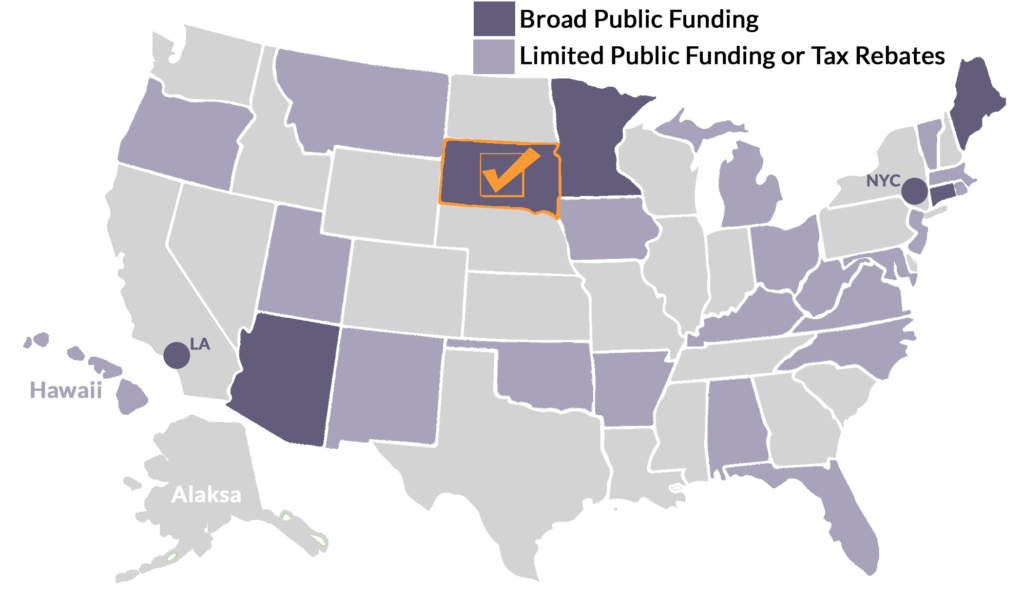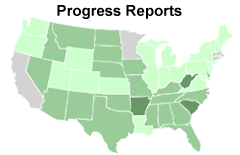How Reformers Beat Koch Bros. in South Dakota
Sioux Falls –Time and again, opinion polls tell us that 70%, 80% and even 90% of Americans believe our political system is broken but think there’s nothing We the People can do about it. Perhaps a progressive state like California or Massachusetts might pass an isolated reform, but the political cognoscenti regard the rest of the country as hopeless because billionaires, corporations, and special interests have such a strong lock on power.
But this year, the improbable happened in South Dakota, a solid Red state where the deck is heavily stacked against reform. A band of prairie populists, undeterred by the odds, forced a popular vote on political reforms that wound up making South Dakota the first state in a decade to adopt public funding of political campaigns, sending a message nationwide that citizen-led grass roots reform is doable, even in Red states.

David and Charles Koch, of Wichita, Kansas. Artwork (CC): DonkeyHotey.
Victory was an uphill battle, David vs Goliath. A new citizens group called TakeitBack.org pitted grass roots volunteers against a business-conservative coalition led by Americans for Prosperity, the richly financed political organ of Kansas billionaires Charles and David Koch, as well as taking on the most powerful Republican leaders in South Dakota.
“This is about opening up our democracy and letting people have a voice again. Getting people to believe that it matters again,” said Rick Weiland, a co-founder of TakeItBack.Org. “We’re on a very slow downhill spiral, you know, where our democracy may not survive. And so here’s an opportunity for people to re-engage. Their votes should count. They should have a voice.”
You Can’t Fix Washington – Go to the States for Reform
The citizen revolt was the brainchild of Weiland, who ran for the U.S. Senate as a Democrat in this heavily Republican state in 2014 and lost, and his friend, Drey Samuelson, a veteran of 28 years as Capitol Hill chief of staff for former Democratic Senator Tim Johnson. Samuelson gave up on Washington and came home to push for reform.
“Why do it here in South Dakota?” I asked. “Why not just fix the system in Washington?”
“I was sick and tired of the way the system in Washington worked,” Samuelson told me. “It is not possible to change the system in Washington. There’s too much anger, there’s too much hyper-partisanship. There’s too much suspicion of the other side. The only way we’re going to change Congress, in my opinion, is by changing the states and forcing Congress to change.”

Reform leaders of TakeItBack.Org – Drey Samuelson (left) and Rick Weiland (right).
Together, Samuelson and Weiland spent 18 months carefully stitching together a homegrown coalition of Democrats, Independents and such Republicans as former Senate Majority leader Dave Knudson, former State Treasurer David Volk, former State Senator Don Frankenfeld and Rick Knobe, former Republican Mayor of Sioux City, now a political independent.
A Triple-Play Reform
Prairie Populism has a long history and passionate apostles in the Dakotas. In 1898, South Dakota became the first state in the nation to let citizens exercise the power of ballot initiatives – writing laws and petitioning to put them on the ballot for a popular vote. This year, with support from the South Dakota Farmers Union, League of Women Voters, and such national reform groups as Represent.Us and OpenPrimaries.org, the TakeItBack coalition collected 100,000 signatures, enough to put three reform measures on the ballot.
One initiative proposed a non-partisan primary to replace the two party primaries and to include South Dakota’s 115,000 political independents (22% of the electorate). A second ballot measure called for gerrymander reform to break a one-party monopoly on mapping congressional and legislative districts by giving that job to an independent multi-party commission (Three R’s, three D’s, and three I’s.)
The most sweeping proposal, Initiated Measure-22, offered a package of reforms aimed at fighting special interest corruption and the influence of Mega Money in campaigns. It proposed a South Dakota Ethics Commission, much lower limits on PAC contributions, greater transparency on campaign donations, and empowering average voters by setting up a $12 million state fund to give each voter $100 in democracy vouchers to donate to candidates of their choice.
“You actually get to take your tax dollars back and invest them in candidates that you think are going to do your bidding in the state capital – make the person running for office less dependent on the thousand dollar check writer,” Weiland said. “It levels the playing field. It also lowers the amount of money the big spenders, the big givers, can give.”
Triggering A Storm of Opposition
That reform package, especially IM-22 – kicked up a storm. Americans for Prosperity, the richly-funded political organ of the Koch brothers rallied political allies like the South Dakota Farm Bureau and Chamber of Commerce, and spent hundreds of thousands of dollars rolling out waves of radio ads and statewide mailings, warning that “scheming politicians want to use our tax dollars to pay for their political campaigns.”

Ben Lee, leader of South Dakota Americans For Prosperity and the Defeat-22 coalition.
“Initiated Measure 22 comes across as a nightmare to me, in part because of its length,” said Ben Lee, South Dakota head of Americans for Prosperity. “With 34 pages and 70 different changes to law, it’s a monstrosity to try to learn and digest.
“The centerpiece for it all is publicly funded campaigns, which is another way of saying taxpayer-funded elections and we simply think that using tax dollars to fund political campaigns is one of the worst uses for tax dollars that you could come up with.”
Republican Governor Dennis Daugaard and the state’s two Republican Senators, John Thune and Mike Rounds, attacked the reformers as disgruntled Democrats trying to change the political rules after losing a bunch of state elections.
‘You’ve stirred up a hornet’s nest,” I suggested to Weiland, and he shot back: “You’ve got to stir the pot and whack the hornet’s nest. That’s how you can make change when the political establishment and the status quo is refusing to do so.”
The Power of Retail Politicking on Main Street
Like its opposition, TakeItBack.Org ran a modest TD and radio ad campaign and won newspaper endorsements for reform. But its hallmark was an unusual commitment to shoe-leather, retail politics. A team of college and graduate students went door to door in major cities like Sioux Falls and Rapid City while Weiland drove out to small and medium-sized towns, stopping in cafes and diners and going down Main Street, store to store, generating coverage in local newspapers and interviews on local radio.
His pitch for an ethics commission resonated with voters angered by news reports of corruption in state government. “They say South Dakota is the fifth most corrupt government in the country,” said voter Allan Bruemmer of Madison. “Now you know, there’s one category we don’t want to be up near the top.”

Army veteran Justin Otoski, a volunteer for reform.
For a low-budget campaign, social media was critical. One Facebook post that reached 68,000 viewers showed 28-year-old Army veteran Justin Otoski telling how he came back from duty in Afghanistan and was disgusted by the nasty partisan warfare in U.S. politics. He decided to take a term off from college and volunteered to work full-time in the reform campaign.
“I feel like came back from a combat warzone to a political warzone, and it’s just frustrating,” Otoski said. “Our politicians care more about winning for the party, winning for themselves, rather than winning for America, doing what’s best for their constituents.”
Another Facebook posting revealed that Samuelson, a career public servant, had personally donated $50,000 to the reform campaign from the sale of his late mother’s home. “I’m not a rich guy but money just isn’t that important to me and this is important to me,” Samuelson explained. “And I felt that was the best way to honor her and honor the way that I was raised.”
The Ripple Effect for Other States
On Election Day, the two proposals for gerrymander reform and a non-partisan primary were defeated. But IM-22, with its ethics commission, campaign donation limits, and those $100 democracy vouchers, won a slim 52% majority, making South Dakota the fifth state with a potentially robust system of public funding for election campaigns, along with Arizona, Connecticut, Maine and Minnesota.
 With the landscape of power in South Dakota destined to be altered as the reform is implemented, I asked Weiland whether he foresaw “a ripple effect,” especially in the 25 other states that also give citizens the power to put reform initiatives on the ballot.
With the landscape of power in South Dakota destined to be altered as the reform is implemented, I asked Weiland whether he foresaw “a ripple effect,” especially in the 25 other states that also give citizens the power to put reform initiatives on the ballot.
“Absolutely,” Weiland shot back. “I believe that this victory sends a message to the rest of the country that they don’t have to put up with the business-as-usual crowd. They can take matters into their own hands. We have a real opportunity to take what we’ve done here and show it to other states — putting these ideas on your ballot in 2018, 2020 and ’22.”


 Hedrick Smith, who conceived this website and is its principal writer and architect, is a Pulitzer Prize-winning former New York Times reporter and Emmy award-winning documentary producer for PBS and PBS FRONTLINE.
Hedrick Smith, who conceived this website and is its principal writer and architect, is a Pulitzer Prize-winning former New York Times reporter and Emmy award-winning documentary producer for PBS and PBS FRONTLINE. 


